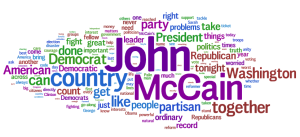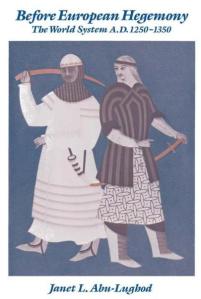Would you prefer a promise or a fight? A different take on Obama-McCain
Hot on the heels of last week’s word cloud for Barack Obama’s acceptance speech, I’m delighted to be able to do the same for John McCain’s acceptance speech. The word cloud is below and as you can see some old reliables crop up: country is more important than world, Washington gets a bit of a grilling, and “change” is about as prominent in McCain’s speech as it was in Obama’s. That latter one sounds about right, when you think about just how much the GOP have decided – better late than never, I guess – that ‘change’ is working with the voters and that the Party had better make it look like they’re also not in the White House at the moment, so they can call for it too!

Whereas Obama’s little surprise was ‘promise’, tying him right back to Martin Luther King, McCain’s was ‘fight’. The language is interesting, because it ties in to a broader strategy that the GOP are using, pitching the voter as essentially having to fight ‘the system’ in his or her daily grind and that plucky John McCain will be there on your side. The implication – particularly bearing in mind the now infamous ‘celebrity’ ad – is that Obama and his team are insiders, benefitting from a corrupt system. There’s almost an Orwellian feel to that kind of spin, when you think about the respective Washington careers of the two candidates!
In other news, Mitt Romney is nuts. As Paul Krugman wrote in an excellent article in the New York Times:
Can the super-rich former governor of Massachusetts — the son of a Fortune 500 C.E.O. who made a vast fortune in the leveraged-buyout business — really keep a straight face while denouncing “Eastern elites”?
Apparently, he can. As you can see from his word cloud, the fact that he’s done rather well out of the whole set up doesn’t faze him. He blazes on about those liberals and how voting for the incumbent party would really annoy those Washington elites. He reminds me of Mr. Burns’ speech when running for mayor, speechifying in good old-fashioned American style about going down to the Capitol and sorting out those fat cats!

What I particularly liked, though, was what he didn’t say. His word cloud makes by far the least reference to John McCain of all the main speeches at the Republican National Congress. In fact, you can almost use the prominence of McCain in the cloud of each of the speakers to work out who likes (and knows) him most. For example, take John McCain’s ‘best mate’, in a political sense, Joe Lieberman. John McCain this, John McCain that, you couldn’t get him to stop. (Incidentally, contrast that with next to nothing for poor old Dubya and even Obama!)

There’s a similar story with the man who’d always said all along that he’d back McCain if he weren’t the nominee, Rudy Giuliani. He seemed to be most frank about who was actually in the election, McCain and Obama.

Mike Huckabee also spoke – he’s a bit of legend, to be fair. First of all, it was an excellent speech, really well delivered. And secondly, the man said the word ‘desk’ – you figure it out – almost as much as he did John McCain! “John McCain want desk something something.”

Then there was Sarah Palin, who to be fair to her doesn’t really know McCain at all. She mentions him a little, certainly more than Mitt Romney, but nowhere as near as often as Lieberman or Giuliani.

What I found interesting about her speech is that it didn’t really mention Obama at all. In fact, while the total lack of reference to George Bush is entirely understandable, particularly when you bear in mind that the Republican congress was designed to make them not look like the incumbents, the almost equally deafening silence in relation to Barack Obama is a little perplexing. For an election that’s supposed to have whittled down to a referendum on whether Obama is suitable, both congresses certainly talked about John McCain a lot!
Just as I was writing this, I came across a good analysis by the New York Times, which takes a few key issues and assesses the frequency of their use. The big issues for Republicans were taxes and businesses, while the key topics for Democrats were healthcare, energy and the economy/jobs. A surprise? Probably not.
At the end, I think Barack ‘promise’ Obama and John ‘fight’ McCain is a good summary of the candidates. The question now is: which one would you choose?









